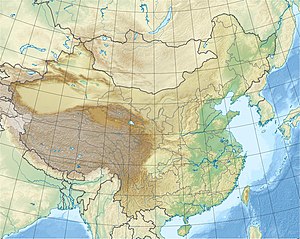This article needs additional citations for verification. (May 2023) |
Kashgar
Kashi | |
|---|---|
 Location of Kashgar (red) within Kashgar Prefecture | |
| Coordinates (Kashgar municipal government): 39°28′05″N 75°59′38″E / 39.4681°N 75.9938°E | |
| Country | China |
| Autonomous region | Xinjiang |
| Prefecture | Kashgar |
| Municipal seat | Östeng Boyi Subdistrict |
| Area (2018)[1] | |
| 1,056.8 km2 (408.0 sq mi) | |
| • Urban | 130 km2 (50 sq mi) |
| • Metro | 2,818 km2 (1,088 sq mi) |
| Elevation | 1,270 m (4,170 ft) |
| Population (2020)[2] | |
| 782,662 | |
| • Density | 740/km2 (1,900/sq mi) |
| • Urban | 920,000[1] |
| Demographics | |
| • Major ethnic groups |
|
| Time zones | UTC+08:00 (CST) |
| UTC+06:00 (XJT, de facto[3]) | |
| Postal code | 844000 |
| Area code | 0998 |
| GDP (Nominal)[4] | 2019 |
| – Total | CN¥22.8 billion US$3.3 billion |
| – Per capita | CN¥34,748 US$5,028 |
| – Growth | |
| Website | www |
Kashgar (Uyghur: قەشقەر) or Kashi (Chinese: 喀什) is a city in the Tarim Basin region of southern Xinjiang, China. It is one of the westernmost cities of China, located near the country's border with Kyrgyzstan and Tajikistan. For over 2,000 years, Kashgar was a strategically important oasis on the Silk Road between China, the Middle East, and Europe. It is one of the oldest continuously inhabited cities in the world and has a population of 711,300 people (as of 2019[update]). Kashgar's urban area covers 15 km2 (5.8 sq mi), although its administrative area extends over 555 km2 (214 sq mi).
At the convergence point of widely varying cultures and empires, Kashgar has been under the rule of the Chinese, Turkic, Mongol and Tibetan empires. The city has also been the site of a number of battles between various groups of people on the steppes.
Now administered as a county-level city, Kashgar is the administrative centre of Kashgar Prefecture, which has an area of 162,000 km2 (63,000 sq mi) and a population of approximately 4 million as of 2010[update].[5] Kashgar was declared a Special Economic Zone in 2010; it is the only city in western China with this designation. Kashgar also forms a terminus of the Karakoram Highway, the reconstruction of which is considered a major part of the multibillion-dollar China–Pakistan Economic Corridor.
- ^ a b Cox, W (2018). Demographia World Urban Areas. 14th Annual Edition (PDF). St. Louis: Demographia. p. 22. Archived (PDF) from the original on 3 May 2018. Retrieved 15 June 2018.
- ^ Xinjiang: Prefectures, Cities, Districts and Counties
- ^ "The Working-Calendar for The Xinjiang Uygur Autonomous Region Government". Xinjiang Uygur Autonomous Region Government. Archived from the original on 9 November 2007.
- ^ "喀什市概况(2020" (in Chinese). 25 November 2020. Archived from the original on 18 January 2021. Retrieved 12 March 2021.
- ^ Stanley W. Toops (August 2012). Susan M. Walcott; Corey Johnson (eds.). Eurasian Corridors of Interconnection: From the South China to the Caspian Sea. Routledge. pp. 65–66. ISBN 978-1-135-07875-1.






